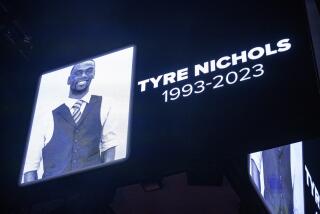Key Witness Lied, Nichols Team Suggests
DENVER — Defense lawyers in the second Oklahoma City bombing trial sought to raise questions Thursday about the character of Roger Moore, a central figure in the case whom prosecutors contend was robbed by Terry L. Nichols to help pay for the terrorist act.
The testimony, coming from a series of neighbors and insurance officials, indicated that Moore has provided differing accounts of what happened at his Arkansas horse farm five months before the April 19, 1995, bombing of the Alfred P. Murrah Federal Building.
The government contends that Nichols robbed Moore of a cache of guns and other valuables and that Timothy J. McVeigh later sold some of the loot to help finance the bombing, in which 168 people died and more than 500 were injured. Earlier testimony has shown that some of Moore’s property was found in Nichols’ home in Herington, Kan.
But the defense contends that there was no robbery. Rather, defense lawyers have strongly suggested that Moore donated the property to McVeigh--convicted earlier this year in the bombing--because he shared McVeigh’s anti-government views.
By raising doubts about Moore’s character, the defense is attempting to poke a series of small holes in the government’s case. But after more than three dozen witnesses in the first three days of their presentation, Nichols’ lawyers have yet to knock down any major parts of the government’s evidence against their client.
On Thursday, Jan Dies, an insurance writer in Hot Springs, Ark., testified that Moore told her the federal government was behind the robbery at his horse farm and, she said, he threatened to kill anyone who came near his property in Royal, Ark. “I was very frightened of him,” she said.
She added that “Mr. Moore told me: ‘The feds did it! The feds did it!’ ”
She said that Moore flashed a badge and bragged to her that he was knowledgeable about the use of explosives.
“Mr. Moore said he was doing his own research,” she said, “and that he was going to put explosives around his house and if anyone came around they would blow up.”
Her daughter, Dana Priddy, who worked at the same insurance company, recalled an incident after the robbery when Moore threatened her because her mother was too busy to take his telephone call.
“That’s when Mr. Moore got angry,” she testified. “He wanted me to interrupt her. He said he was coming to the office to smear me all over the counter.”
Larry Hethcox of Little Rock testified that Moore told him shortly after the robbery that a gunman came from a wooded area near his house and fired at least one shot. In previous accounts, Moore has not mentioned a shot being fired.
Also, Hethcox said that Moore estimated his loss at more than $100,000. In Moore’s testimony in the trial last month, he testified that the loss was about $60,000.
Richard Spivey, an insurance claims supervisor from Little Rock, testified that he investigated the robbery and visited Moore’s farm. Spivey said Moore told him that most of the 77 stolen weapons had been stored in closets.
“I had questions as to whether that large a number of guns could fit into the closets,” Spivey said.
Rodney Bowers, a reporter for the Arkansas Democrat-Gazette, described interviewing Moore after the bombing. Bowers said Moore indicated he had earlier been working in some capacity for federal law enforcement and he complained about receiving negative publicity since the blast that “blew my cover.”
Moore also complained that local authorities never solved the robbery, Bowers testified.
“He felt they were not interested in investigating the case,” the reporter recalled. “He said he did not believe they were sincere in their efforts to investigate the crime. . . . He felt possibly someone in the sheriff’s office might have been involved.”
McVeigh, who was sentenced to death in his trial, did not testify on his behalf. But many of the survivors of the bombing are hoping that Nichols takes the stand and one of them, Marsha Kight, distributed leaflets outside the courthouse Thursday demanding that he do so.
“There are many unanswered questions here that I’m sure Nichols could help us through if he would just try to save his own life by testifying,” she said. “It is Nichols and Nichols alone who can prove to the jury that he was not part of McVeigh’s sickness.”
Nichols’ lead attorney, Michael Tigar, noted that his client has no obligation to testify, and that no decision has yet been made on whether he will.
“She has lost so much,” Tigar said of Kight, whose daughter was killed in the blast. But, the lawyer added: “Every American has a right to a fair trial.”
More to Read
Sign up for Essential California
The most important California stories and recommendations in your inbox every morning.
You may occasionally receive promotional content from the Los Angeles Times.











